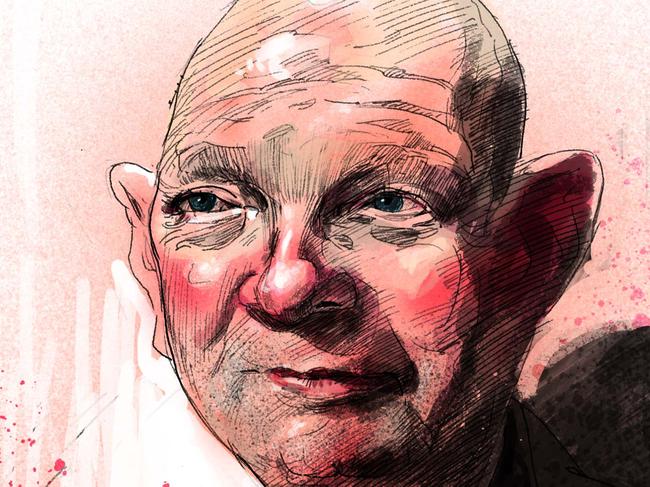The art of the deal: Gordon Cairns, former chairman, David Jones; chairman, Woolworths
Gordon Cairns says the two great questions a business faces are where to compete and how to win.

Like many business people, Gordon Cairns plays down the value of big deals and argues that it is running a business, not doing a deal, that is the real challenge in corporate life.
Former Qube chair and Patrick boss Chris Corrigan is another who reckons the focus on deal-making is a mistake. He tells The Deal: “I am not sure I have ever made a ‘deal’ in the sense that most people think about it. I just don’t think about management as the making of a ‘deal’, but rather as the identification of an interesting corporate direction, the building of a team to give effect to that direction, and the effective execution of the agreed strategic direction.”
Cairns nominates the $2.1 billion sale of David Jones to South Africa’s Woolworths in 2014 – when the former chief executive of Lion Nathan had just taken over as chair of DJ’s – as his best ever deal. However, “I have a low water mark because I’ve done a lot of bad deals,” he jokes.
“The two great questions a business faces are where to compete and how to win,” Cairns says. “If Roger Federer had played badminton we may not have heard of him, but he chose to play tennis and he made himself a lot of money in the process.”
As the David Jones deal went through, Cairns found himself wondering how the South Africans would confront a challenged retail sector and how they were “going to win against Amazon”.
He took the chair at David Jones in March 2014 when the chain was at low ebb. Chief executive Paul Zahra had been backed strongly by shareholders after threatening to resign. Two directors had resigned in the wake of question marks over the timing of share sales amid attempts by Myer to merge with the company. In the end, chair Peter Mason stepped aside after the Myer offer was rejected without any negotiations.
When Cairns took over he talked Zahra into staying, and then asked his finance department to prepare a five-year strategy for the company.
“The reality was the department store retail model was challenged around the world and the right industry structure dictates where you can make money,” he says.
He told Myer chair Paul McClintock that he did not understand its strategy and did not think it was a winner.
‘For every good deal there’s a problem deal. For Cairns, that deal was the decision by Australian Woolworths to buy into the Masters hardware chain.’
“When Ian Moir from Woolworths knocked on the door I already knew the value of our business, thanks to the five-year strategy document from the finance team,” Cairns recalls.
Cairns and Moir, a fellow Scot, met alone without advisers because “it’s a lot harder to rescind a position when others are in the room”.
Moir is from Dunfermline in Scotland, the town made famous by the 15th Century ballad “Sir Patrick Spens”, which every Scottish child once learned at school. Much to Moir’s surprise, Cairns opened the talks by reciting the ballad: “The king sits in Dunfermline toune drinking the blude reid wine…” It broke the ice and Moir started talking about the value of scale and how the combined firm would have better buying power.
Amid the hothouse climate of Myer’s interest, a board shuffle and shareholders in revolt, Moir had suggested $3.75 a share. But Cairns told him at their meeting: “Time is not your friend; there is every chance of a strategic leak so why not give me your best offer now.” He suggested it should have a four in front of it.
Cairns knew from the DJ’s finance report that the intrinsic value was $3.75 a share, or $1.5 billion for the company. Moir responded with an offer at $4 a share, or $2.1 billion.
Knowing his board would jump at the offer, Cairns told Moir he would take it to the other directors, but warned it would be hard work because “it is not a great offer”.
He tells The Deal: “In the negotiations they [Woolworths] made it clear to me that $4 was a walk-away price. When I told the board the price they started whooping with glee.”
Subsequent to taking control, Moir wrote down the value of the transaction to $1.5 billion – the same value David Jones had put on itself.
Says Cairns: “They overpaid significantly. People asked me what plan B was and the truth was I didn’t have one, but I wasn’t going to let them know that.”
But for every good deal there’s a problem deal. For Cairns, that deal was the decision by Australian Woolworths to buy into the Masters hardware chain. Cairns, who became chair of Woolworths in 2015, inherited that $4 billion debacle and says now: “The trouble with Masters is we had the stores in the wrong place with the wrong range, and replicated that 63 times.”
Cairns names the late Sir Doug Myers as the best deal-maker he has been involved with.
“He was good at making himself and other people money,” he says. “He was great at looking at the big picture and surrounding himself with people who controlled the details.” Indeed, Myers’ maxim was “consult, consult, consult”.
Cairns warns that people often overpay when their ego gets in the way of the deal. Speed is also a danger, because doing things too quickly can mean not enough due diligence.
He also follows the Warren Buffett maxim of “never do a deal for its synergy value because the business rarely does it”.



